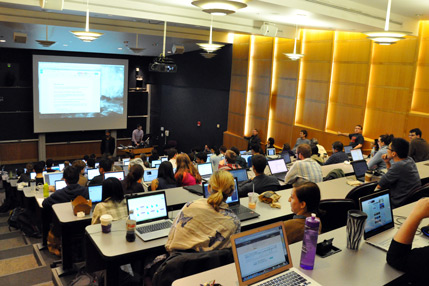Programming Boot Camp Draws Participants from Across Northwestern
One hundred graduate students and post-doctoral fellows built programming skills with one-week boot camp.
From baseball sabermetrics to health care analytics, the ability to read and reach conclusions from massive amounts of digital data is becoming increasingly important as a way to make sense of the world around us.
But just as important is the ability to write the code to collect, process, and analyze that data. Computer programming has emerged as a crucial skill for those working in fields like academia, industry, and government.
To enable the Northwestern community’s growing interest in pursuing opportunities with big data, the university held its first Big Data Initiative: Programming Boot Camp from September 8-12. The week-long boot camp offered graduate students and postdoctoral fellows from across Northwestern a chance to hone the basic skills required to analyze growing volumes of digital data.
“Being able to program to simulate physical, biological, or social systems, as well as to analyze data for different disciplines is important,” said Luis Amaral, professor of chemical and biological engineering at the McCormick School of Engineering and Applied Science and organizer of the boot camp. “If you don’t have the basic skills to structure software to do those tasks, you are at a disadvantage.”
 Nearly 300 students registered for the boot camp, though participation was capped at 100. Those accepted arrived with over three-dozen different areas of academic expertise from schools across the university, including McCormick, the Weinberg College of Arts and Sciences, the Kellogg School of Management, the Feinberg School of Medicine, and the School of Communication.
Nearly 300 students registered for the boot camp, though participation was capped at 100. Those accepted arrived with over three-dozen different areas of academic expertise from schools across the university, including McCormick, the Weinberg College of Arts and Sciences, the Kellogg School of Management, the Feinberg School of Medicine, and the School of Communication.
The boot camp introduced students to Python, a powerful and widely used programming language known for its readability. Students participated in exercises and projects using Python to build skills in software development, object-oriented programming, and simple algorithm creation.
With nearly 20 percent of boot camp participants new to programming, Amaral said the curriculum was structured to gradually introduce them to core concepts and skills throughout the week. The boot camp proved applicable across participants’ diverse research areas.
“Outside of Microsoft Excel, I didn’t know much about programming, but I do a lot of image analysis with microscopes,” said Eric Hill, a graduate student at Weinberg studying molecular biosciences. “It’s been helpful to see how you can analyze the data of an image as an array of numbers. Learning what tools are out there, how to use them, and where to go for help will allow me to be more daring going forward.”
 “Even if it does not have a direct impact on my research right now, I have learned best practices in programming that will be helpful in the future, since many in my field often turn to careers in data analysis,” said Erin Gustafson, a graduate student in linguistics at Weinberg.
“Even if it does not have a direct impact on my research right now, I have learned best practices in programming that will be helpful in the future, since many in my field often turn to careers in data analysis,” said Erin Gustafson, a graduate student in linguistics at Weinberg.
Other participants like Raul Gonzalez, a postdoctoral fellow working in finance at Kellogg, equate programming skills with problem solving.
“I have heard of HR departments requesting that applicants send their programming code, which is a new level of scrutiny that requires you to know what the standards are,” said Gonzalez. “We are learning how to formulate problems. We are creating modules that allow us to solve problems more easily, and we are able to reuse these modules in the future so we don’t have to reinvent the wheel.”
Amaral said the positive response suggests students from across Northwestern will continue to explore opportunities with big data through programming.
“I think students realize how important these skills are and want to have access to learn them. You can use programming in so many contexts and disciplines. It opens doors,” he said.